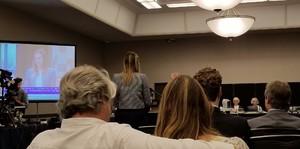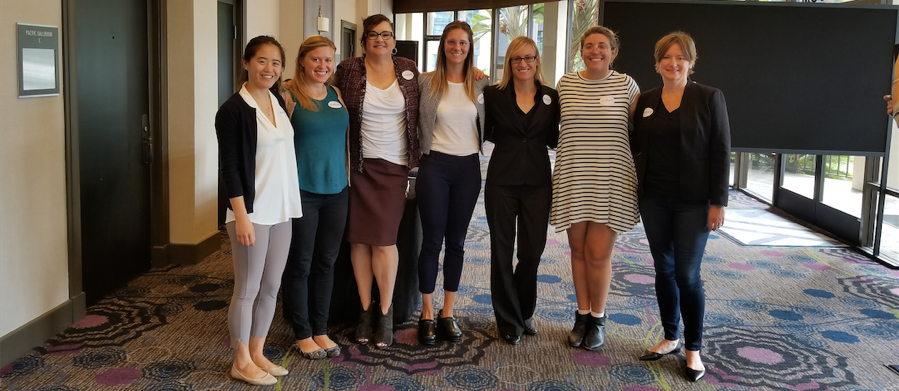Katherine Rainone, MAS MBC Candidate ’19 Photo provided by Cynthia Hsia
I am not a surfer.
That’s not to say I’ve never been surfing, but I wouldn’t exactly say my brief attempt to paddle past the breakwater on the black sand beaches of New Zealand and one surf lesson on Coronado Island make me anywhere close to an expert.
So how did I find myself in front of the California Coastal Commission making a public comment in support of a big wave surf competition? It all started with the MAS MBC program director, Samantha Murray… and ended with a professional surfer, a German filmmaker, and equal pay for women.
All MAS MBC students are required to take Samantha’s Ocean Law and Policy class during the Fall quarter, a course that focuses on U.S.-based legislation and regulations surrounding ocean issues. A big part of the regulatory structure, outlined in the Administrative Procedures Act, requires public participation in the rule-making process. And what better way for us students to learn about this process than firsthand by attending a public hearing and making a comment ourselves!
Fortunately, the California Coastal Commission was holding their monthly meeting in downtown San Diego this past October. The issue I had chosen to comment on was whether or not to approve a permit request from World Surf League (WSL) to hold an event on the beach called the Maverick’s Challenge — a professional surfing competition in Half Moon Bay.
We filled out a form requesting time to speak and settled into our seats. We observed as members of the public spoke passionately and knowledgeably about various issues affecting California’s coastal zone, while the commissioners listened intently and politely asked clarifying questions, thanking each speaker for their time and views. Before I knew it, they had started taking comments for the Maverick’s Challenge permit issue.

When my name was called, my heart started to race — I was not expecting to be so nervous. As I took a deep breath, I was confronted with a giant pixelated version of my face staring directly back at me — quite the shock — but the timer was already counting down from three minutes, so I had to get started. Dayna Bochco, the chair of the commission, smiled warmly as I began my statement and my nerves calmed as the commissioners nodded along as I shared my story of growing up sailing on the Long Island Sound, propelling my boat with only physics, the wind and the waves. It’s what brought me to Scripps to study marine conservation, to protect and preserve the very natural forces I became enamored with so many years prior, and I was confident that allowing this event to take place could instill these same feelings in potential spectators too.
While I knew pay equity for women surfers was peripherally a part of this permit request, I did not realize the weight of the issue. Professional surfer Cori Schumacher took the podium, and the room quieted as she spoke of how important a precedent the Coastal Commission was setting by requiring the WSL to provide equal prize money to both male and female winners — something that had impacted her personally in the past. To say her statement was compelling would be an understatement.
A few commissioners made brief statements to one another, the chair asked if there were any nay votes, and without much fanfare, the issue was passed and the permit was granted. Some members of Cori’s team asked us to come outside to thank us for adding our voices to the cause and snap a photo, and a German filmmaker who was making a documentary about gender pay equity in the surfing industry asked us to make brief statements on camera about what it was like to be in the room for such a historic decision.
Were I to do it all again, I would practice my statement out loud a few more times in order to make a stronger impact. But since it was my first time making a public comment at a hearing, the nerves only added to my excitement in taking part in my civic duty to protect our coasts. It was so easy — and since the California Coastal Commission meets every month, you can share your opinions too.

